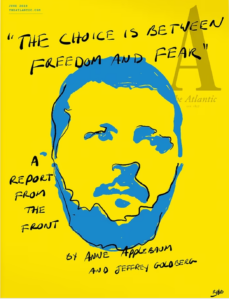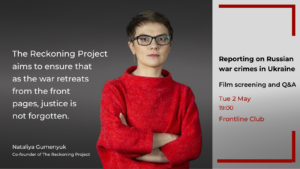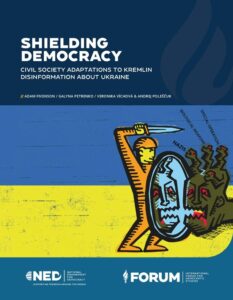 The future of democracy worldwide depends in part on whether the Ukrainian army can break the current stalemate and achieve complete victory, two leading analysts assert in a new Atlantic cover story.
The future of democracy worldwide depends in part on whether the Ukrainian army can break the current stalemate and achieve complete victory, two leading analysts assert in a new Atlantic cover story.
“Uniquely, the United States has the power to determine how, and how quickly, the war of attrition turns into something quite different,” Anne Applebaum and Jeffrey Goldberg contend. “Over the next few months, as the Ukrainians take their best shot at winning the war, the democratic world will have to decide whether to help them do so. Sovereignty, safety, and justice—shouldn’t Americans want the war to end that way too?”
Sometimes, the war in Ukraine is described as a battle between autocracy and democracy, or between dictatorship and freedom. In truth, the differences between the two opponents are not merely ideological, but also sociological, they observe.
Ukraine’s struggle against Russia pits a heterarchy against a hierarchy. An open, networked, flexible society—one that is both stronger at the grassroots level and more deeply integrated with Washington, Brussels, and Silicon Valley than anyone realized—is fighting a very large, very corrupt, top-down state, they write for The Atlantic:
 Ukrainians aren’t the only ones hoping that their success can support and sustain a civilizational change. Russia, as it is currently governed, is a source of instability not just in Ukraine but around the world. Russian mercenaries prop up dictatorships in Africa; Russian hackers undermine political debate and elections all across the democratic world. The investments of Russian companies keep dictators in power in Minsk, in Caracas, in Tehran. A Ukrainian victory would immediately inspire people fighting for human rights and the rule of law, wherever they are. RTWT
Ukrainians aren’t the only ones hoping that their success can support and sustain a civilizational change. Russia, as it is currently governed, is a source of instability not just in Ukraine but around the world. Russian mercenaries prop up dictatorships in Africa; Russian hackers undermine political debate and elections all across the democratic world. The investments of Russian companies keep dictators in power in Minsk, in Caracas, in Tehran. A Ukrainian victory would immediately inspire people fighting for human rights and the rule of law, wherever they are. RTWT
China wants to see Western global economic and political leadership diminished. But Russia’s all-out invasion of Ukraine has produced the opposite effect, says Kurt Volker. The democratic West is more united and active, he writes for the Center for European Policy Analysis.
A crucial economic lifeline for Ukraine is being jeopardized by eastern European governments
contending with the limits of public support for Kyiv as the war stretches into its second year, Bloomberg’s Piotr Skolimowski reports.
Nowhere is the shift more vivid than in Poland, a stalwart ally of Ukraine that has led the European Union in denouncing the Russian invasion, he adds. Warsaw issued a surprise ban on Ukrainian grain imports last month after weeks of street protests by Polish farmers over a grain glut that triggered a collapse in prices. Restrictions quickly followed in Hungary, Slovakia and Bulgaria.
 Ukrainian journalist Nataliya Gumenyuk (right) will be joined by international lawyer Ibrahim Olabi to speak about the work of The Reckoning Project: Ukraine Testifies. Three short documentaries produced by The Reckoning will be followed by a Q&A moderated by David Knowles, host of The Telegraph’s Ukraine: The Latest podcast. Tickets: https://www.eventbrite.co.uk/…/reporting-on-russian-war…
Ukrainian journalist Nataliya Gumenyuk (right) will be joined by international lawyer Ibrahim Olabi to speak about the work of The Reckoning Project: Ukraine Testifies. Three short documentaries produced by The Reckoning will be followed by a Q&A moderated by David Knowles, host of The Telegraph’s Ukraine: The Latest podcast. Tickets: https://www.eventbrite.co.uk/…/reporting-on-russian-war…
#China wants to see Western global economic & political leadership diminished. But #Russia’s all-out invasion of #Ukraine has produced the opposite effect: The democratic West is more united & active, @kvolker writes for @NEDemocracy partner @cepa. https://t.co/9JRc9FjpSk
— Democracy Digest (@demdigest) May 1, 2023
 Accountability for U.S. aid is imperative, both for the American taxpayer and for Ukraine’s own development as a functioning democracy and a trustworthy ally. But to suggest that the United States cannot afford to support Ukraine—or cannot afford to support Ukraine while deterring China—is not plausible, notes George Weigel, Distinguished Senior Fellow of Washington, D.C.’s Ethics and Public Policy Center and a former National Endowment for Democracy (NED) board member.
Accountability for U.S. aid is imperative, both for the American taxpayer and for Ukraine’s own development as a functioning democracy and a trustworthy ally. But to suggest that the United States cannot afford to support Ukraine—or cannot afford to support Ukraine while deterring China—is not plausible, notes George Weigel, Distinguished Senior Fellow of Washington, D.C.’s Ethics and Public Policy Center and a former National Endowment for Democracy (NED) board member.
Rebuffing Putin’s aggression and sustaining Ukrainian sovereignty will make the world, and Americans, safer, while demonstrating to China that the mature democracies that are the backbone of a decent global order have not decayed into fecklessness, he writes for First Things.
The war pits #Ukraine’s heterarchy against #Russia‘s hierarchy – an open, networked, flexible society against a very large, very corrupt, top-down state, The @TheAtlantic‘s @JeffreyGoldberg & @NEDemocracy board member @anneapplebaum report. https://t.co/kgbCQ2xO0R
— Democracy Digest (@demdigest) May 1, 2023







